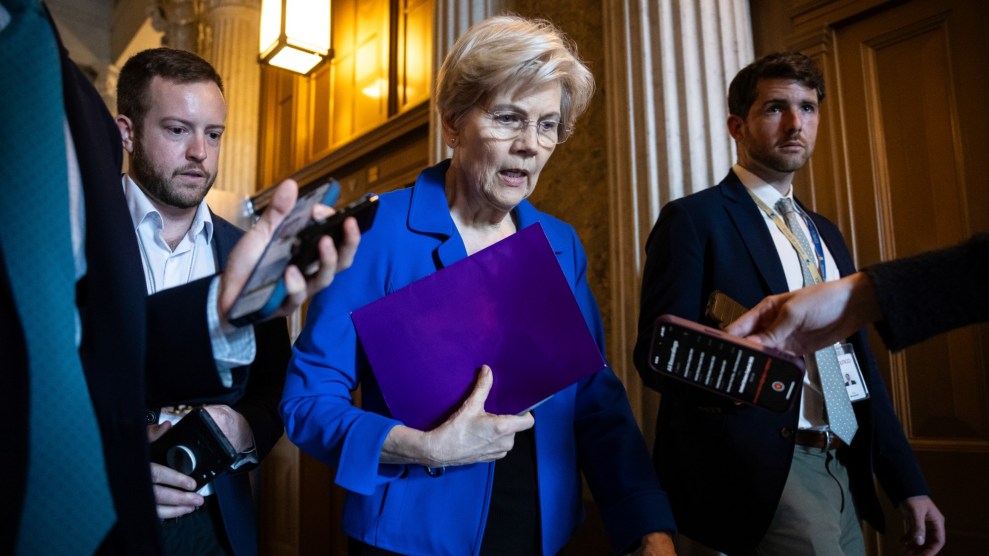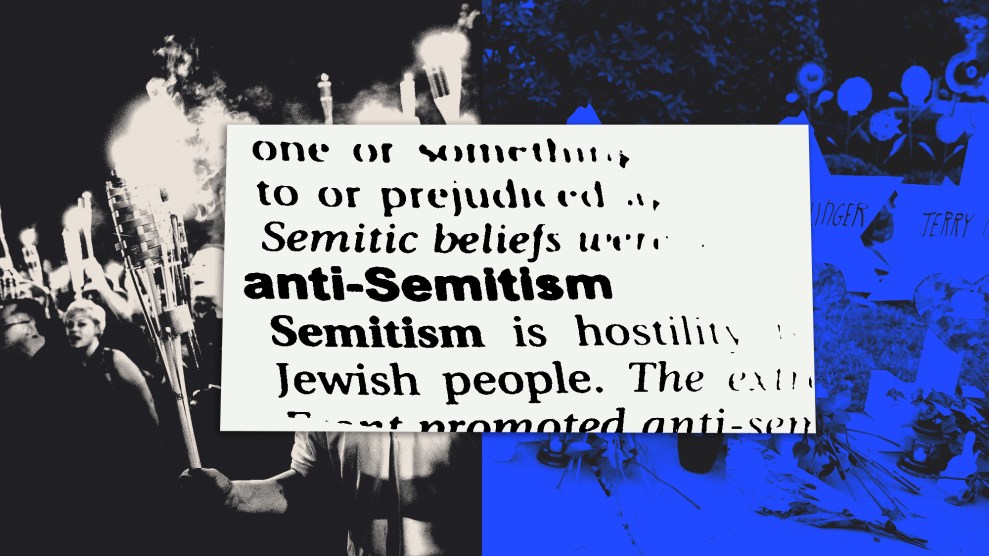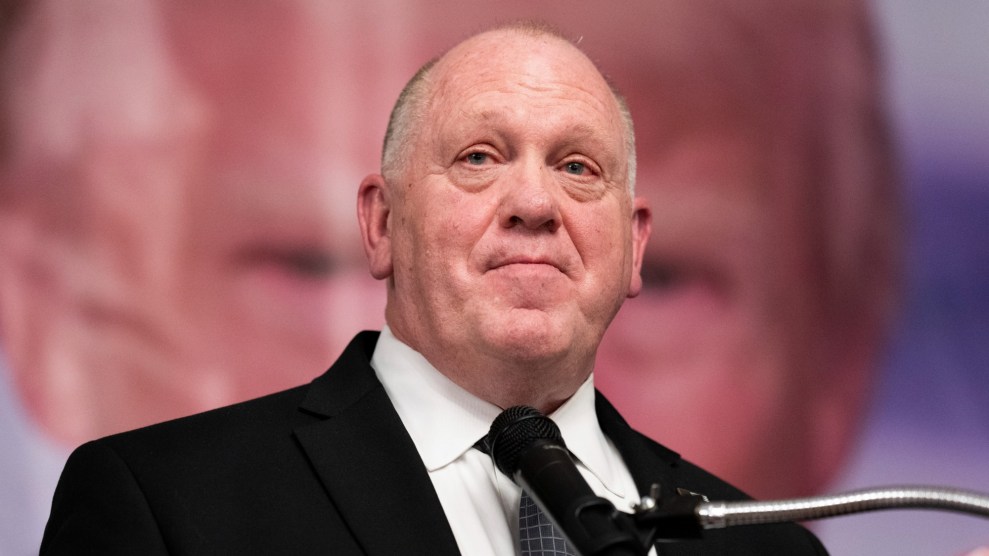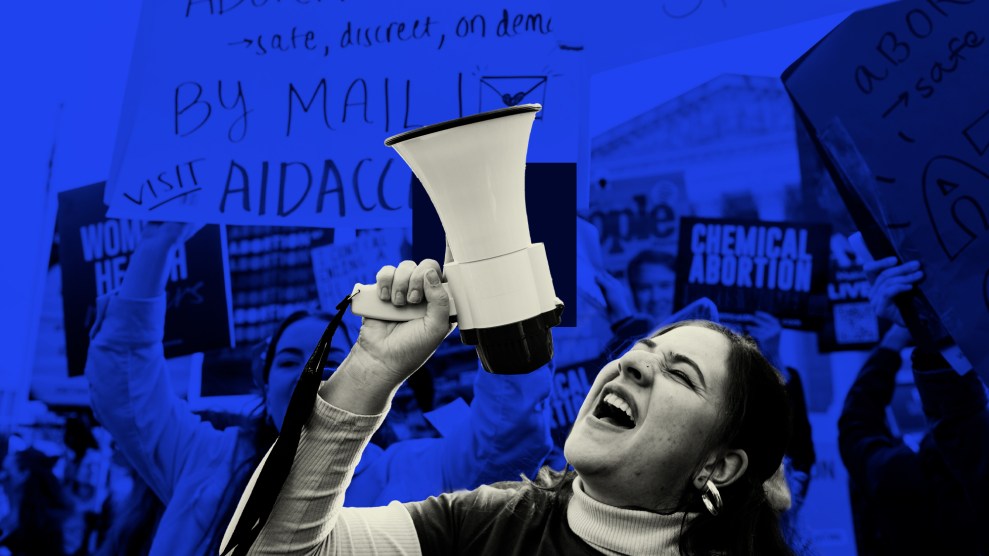Plus: Tips on how to tell a phony grassroots phone caller from the real thing.
At first the call sounds like it could be from any obnoxious telemarketer. But this pitch is selling populism. “Hello, my name is ________,” says the voice on the other end of the phone. He’s calling to stir up opposition to one of this fall’s hottest topics: a proposed expansion of the Rio Treaty, a clean air standard meant to reduce global warming. “This issue could cause [you] to pay a lot more for the basic necessity of electricity that [you] use at home and at work. Additionally, it could put many Americans out of work.”
Calls just like this one — which offer the listener a chance to get angry and speak out about those nasty politicians, all without spending a dime — are being made across America.
This particular call went out last summer to residents of Iowa. The caller reads from a script, asking supporters to sign an “open letter” to Clinton and to Congress opposing this “anti-family” treaty, which cracks down on carbon dioxide (CO2) emissions, imposing costly restrictions on the coal, oil, and gasoline industries. He invites them to join a “grassroots effort” to help Iowans keep utility costs down in a state where 83 percent of the electricity used is coal-generated. The goal: convince Clinton and the Senate to oppose any attempts to toughen global-warming regulations at a United Nations summit in December in Kyoto, Japan.
Many will sign on, believing they’ve joined a local grassroots campaign. Maybe they’ll even feel a little better for having participated in the democratic process. They will have been had.
When asked, callers say they represent the Western Fuels Association, an innocently named group that’s actually a front for the coal industry. And they never reveal who really employs them: a Washington, D.C., lobbying firm called Bonner & Associates, a leader in the growing field of fake grassroots — or “astroturf” — lobbying.
It’s a lobbying machine destined to keep growing: By 1995 astroturf lobbying had become an $800 million industry, according to Campaigns and Elections magazine. And the industry received encouragement in 1995 when Congress exempted grassroots lobbyists from new disclosure requirements, after conservative groups, led by the Christian Coalition, argued that they would amount to an assault on free speech.
That can only mean more of the kind of free speech employed by the phone operators at Bonner & Associates, who, according to a stack of company documents obtained by Mother Jones, have mobilized thousands of people to speak up — without having any idea they’re actually speaking up for blue chip corporate giants, such as Philip Morris, Northrop Grumman, Ford, McDonald’s, and Browning-Ferris.
The pitch is as slick as that of any national political campaign. According to the Western Fuels phone script, CO2 is a “benign gas that is good for forests, plant life, and agriculture,” and scientific claims to the contrary are based only on “computer guesses.” Actually, 2,600 top scientists have backed studies that show CO2 causes global warming. Among the few who disagree are Dr. Patrick Michaels of the University of Virginia, whose work has been financed by Western Fuels and the German Coal Mining Trade Association, and S. Fred Singer, who has received support from Exxon, Shell, and ARCO.
Founded by Jack Bonner, a former aide to the late Republican Sen. John Heinz of Pennsylvania, Bonner & Associates has made its reputation by crafting subtle strategies that can’t easily be traced to corporate interests. The firm uses traditional astroturf lobbying tactics, including letter-writing campaigns and patch-through calls (in which telemarketers get voters riled up on an issue, coach them on how to voice their opposition, and immediately forward the calls to congressional offices).
Such tactics are becoming easier to spot. The American Sugar Alliance hired Bonner to press Congress in 1996 to maintain the sugar industry’s government subsidy, widely criticized as corporate welfare. Gary Lindgren, press secretary for Rep. Steve Chabot (R-Ohio), a target of the campaign, says Chabot’s office received quite a bit of mail and phone calls, but that they clearly originated from an astroturf effort. It’s often easy to tell when a lobbying campaign is not generated in the district, Lindgren notes, because “a lot of times, people are reading off a prepared script.” He says many who called Chabot’s office seemed poorly informed about the legislation. “Most didn’t have any idea it had to do with the sugar subsidy,” Lindgren says. “They were calling out of a concern that the specific piece of legislation was going to hurt American business interests.”
But Bonner & Associates has also developed less transparent methods. The sugar industry’s campaign, for example, benefited from Bonner’s forte: enlisting “white hats” — local groups with broad political appeal — to sign on in support of a campaign while allowing the client to remain hidden from view. As Bonner (who declined to be interviewed for this story) once told Newsweek, “Some guy in a pinstripe suit telling a senator this bill is going to hurt Pennsylvania doesn’t have the impact of someone in Pennsylvania saying it.”
At the time, for example, Bonner & Associates claimed that the sugar subsidy had received support from such groups as the Detroit Association of Black Organizations, the Mideast Baptist Conference, and the Allegheny Labor Council. But Melvin E. Byrd, executive director of the Detroit Association of Black Organizations, says he has no idea how his organization came to be associated with the issue. “We definitely don’t have an interest in that,” Byrd says. “It’s a little far-fetched for us to be involved in the sugar subsidy.”
In the end the subsidy survived. Luther Markwart, the American Sugar Alliance’s chairman, wrote in a letter to Bonner that the sugar industry’s victory owed much to the “well-briefed and high quality of the grassroots supporters who made the initial calls, as well as the overall management of the calls by your staff.”
In another case, Detroit automakers opposed to a bill that would have required them to build more- fuel-efficient cars hired Bonner to defeat it. He enlisted groups representing seniors and people with disabilities, who have a hard time getting in and out of smaller cars, to voice their dissent. He also gathered support from police officers, who feared the bill would result in police cruisers being replaced by Toyotas. Bonner even rounded up a show of support from the Boy Scouts of America. The proposal was defeated.
One of Bonner & Associates’ most innovative strategies is what could be described as a “virtual petition.” When phone operators find supporters, they fax them letters of support, asking them to sign their name inside a box and fax it back. Bonner’s team then scans the signature into a computer and transposes it onto a petition to send to lawmakers — with the hope of deluding them into thinking it came from a constituent who went door-to-door gathering support.
For Western Fuels, Bonner placed a full-page ad in the July 21 Des Moines Register under the heading “Open Letter to the Congress, President Clinton, and Vice President Gore.” The ad, which contained the signatures of 19 prominent Iowans, declared that stiffening the Rio Treaty would result in families being “forced to pay much more for the basic necessity of electricity,” and that “many scientists cannot agree that global warming is a real and significant problem.”
Most of the signatures scanned onto the ad belonged to business leaders, such as Sharon Presnall of the Iowa Bankers Association and Matt Eide from the Iowa Association of Business and Industry. The ad also featured signatures from labor officials, including Roger Boyles of the carpenters’ union in Cedar Rapids, which represents 550 carpenters.
But Boyles told Mother Jones that he has only a vague recollection of having signed a statement, something that had to do with “changes in the environment” that might cost local union members their jobs. He says he thought he was supporting a local effort. Upon hearing that the Western Fuels campaign is being run out of a Beltway lobby shop, Boyles says, “That would kind of flat piss me off.”
While Boyles signed the fax, he didn’t read the fine print — which permits Bonner to use the signature — and was shocked to see his name in the ad. “They should have asked my opinion when they put my name in the paper,” he says.
Len Hersh, who represents the Operating Engineers of Iowa, also was upset to learn about Bonner’s role in the ad, which used his signature. “I didn’t realize it was a big lobbying group,” he says. “Maybe I’m realizing a guy got duped a little.”
Dave Jones of the Cedar Rapids painters’ union admits that Western Fuels’ consumer angle intrigued him, but he says he refused to sign on to the campaign, even after Bonner’s hucksters called him about six times, because he had never heard of Western Fuels and the callers’ pitch made him suspicious. “They were soliciting signers to their position without adequately explaining what they were signing on to,” Jones says. “They’re trying to manipulate people.”
Considering the products it represents, Bonner & Associates can be proud of its sales record. Northrop Grumman has twice employed Bonner’s firm to protect funding for the B-2 bomber, which at $2 billion per plane is the most costly item of military equipment ever designed — and an object of scorn to the General Accounting Office, which has reported, among other embarrassments, that the stealth plane’s radar system cannot distinguish between a rain cloud and a mountainside.
In 1991, when it appeared that the end of the Cold War would lead to a collapse of congressional support for the B-2, Bonner phone calls prodded thousands of organizations — representing seniors, minorities, religious groups, and farmers — to send cards and letters to Congress and request continued production of the bomber.
In 1996, Northrop again hired Bonner after President Clinton decided to include no new money for the B-2 in the 1997 budget. Bonner & Associates wrote a letter for Los Angeles-based Northrop to send to its employees, retirees, and suppliers, stating it was “absolutely vital” to inform President Clinton that his action would have a negative impact “on you, on California, and on the country.” The letter provided a toll-free number to call, with an operator standing by to take orders for messages to the White House. Northrop and Bonner did not succeed in freeing up more cash for the B-2, but they did convince Clinton and Congress to maintain funding for the 20 bombers the government had previously ordered.
Philip Morris hired Bonner in 1994 when the Occupational Safety and Health Administration proposed a rule that would have restricted workplace smoking to rooms with separate ventilation systems. Bonner’s work, along with similar “grassroots” efforts, produced the largest letter-writing campaign in OSHA history, generating 105,000 letters. It paralyzed the agency, which now says it will be unable to issue a ruling on workplace smoking until next year.
Bonner & Associates is also playing a role in the current battle over energy deregulation. And in that campaign, the firm has no problem using a pitch that directly contradicts the Western Fuels campaign.
Proponents of deregulation, led by natural gas giant Enron, argue that Congress should break up utility monopolies and let consumers pick their power provider the same way they pick a phone company. Enron and its allies have created a number of front groups, such as the Electricity Consumers Resource Council — these “consumers” include Amoco, Shell, Monsanto, General Motors, Procter & Gamble, Ford, and DuPont.
Among those opposing the deregulators is a Bonner client, the Electric Utility Shareholders Alliance (EUSA). Although it depicts itself as a humble, folksy group that represents “individual investors holding millions of shares of utility company stock,” EUSA is dominated by big utility companies — members include Commonwealth Edison, Carolina Power & Light, and Hawaiian Electric Industries — that want to keep their monopoly position.
Bonner’s operators send their targets a letter burning with populist fervor — on EUSA letterhead and with the words “grassroots effort” prominently displayed in the upper left-hand corner. It urges them to “stand up to the big corporations” pushing utility deregulation, and warns that if they don’t act, the “big boys in Washington” will determine policy on electricity, instead of “the folks in your state.” (The letter is signed by Randal Joyner, identified as EUSA’s “regional grassroots coordinator.” A phone call to Bonner & Associates revealed that Joyner works at its Beltway headquarters.)
At the same time some of Bonner & Associates’ phone staff canvassed for the EUSA campaign, others made calls on behalf of Western Fuels’ fight against strengthening the Rio Treaty, alleging that its clean air proposal would unfairly pick on the coal industry.
Bonner’s literature for EUSA warns that energy deregulation will “hurt the environment — especially the air we breathe.” EUSA chairman William Steinmeier says deregulation will encourage utility companies to bring on line cheaper, coal-fired plants, which will produce harmful CO2 emissions and cause an increased use of less environmentally safe energy sources, “such as dirty coal-burning power plants that have a negative impact on the environment.” This certainly doesn’t jibe with Western Fuels’ campaign, which describes CO2 as a “benign gas,” beneficial for forests and plants.
When contacted by Mother Jones for this story, Western Fuels spokesman Ned Leonard said it posed no conflict of interest: “Bonner basically does what their client is telling them to do.” And EUSA’s Steinmeier brushed off the contradiction as politics as usual. After all, he says, “if you dig hard enough, you’ll find that I’m also a consultant for the Center for Energy and Economic Development, which is sponsored by coal interests.”
Ken Silverstein is co-editor of CounterPunch, a Washington, D.C.-based investigative newsletter. His new book, Washington on $10 Million a Day: A Shopper’s Guide for Lobbyists, will be published next year by Common Courage Press. Mother Jones investigative reporter Rachel Burstein contributed to this story.















